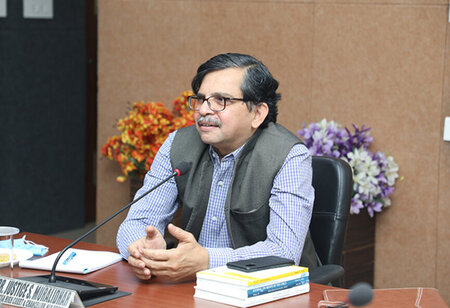Justice Muralidhar: Media must strive for independence, as many are under control
Former Orissa High Court Chief Justice S Muralidhar said that the media in India has had to fight for its independence because many mainstream media outlets are either owned by "large corporate houses or political parties".
He told reporters that the media's job is to hold people accountable, and it cannot do this well if it is subject to political and corporate interests.
He emphasized the "increasing constraints on independent journalism" and the difficulties caused by political and corporate influence on the media, asserting that political parties or corporations control a significant portion of the major print and electronic media outlets.
"India's media has had to fight for independence and freedom. However, it is true that large corporations or political parties own the majority of mainstream print and electronic media outlets. Both print and electronic media operate solely for commercial purposes, relying on government advertisements, licenses and permissions, corporate sponsorships, and commercials," he stated.
While the information and broadcasting minister recently described the Indian press as 'robust and flourishing,' the former chief justice contended that this description does not imply "free and independent."
"The mainstream media today operates on purely commercial lines, relying on government advertisements, corporate sponsorships, and political patronage," he stated. He continued: "This dependence has led to rampant self-censorship, paid news, and the prioritisation of profit over journalistic integrity."
He invoked Joseph Pulitzer's warning, which stated that when a publisher views the press solely as a business venture, it loses moral authority. In today's India, the race for TRPs and corporate funding has created a media landscape in which independent journalism is under threat, he claims.
Justice (retired) Muralidhar expressed concern about the "growing alignment of mainstream media with the establishment".
During a recent panel discussion, he mentioned that a senior lawyer and MP from the ruling party dismissed any concerns about media bias, claiming that corporate-controlled media was simply exercising its 'free choice' to back the government.
This 'choice,' Justice (retired) Muralidhar contended, is frequently the result of pressure rather than genuine editorial independence. Despite these challenges, he remains optimistic about the resilience of independent journalists.
He cited examples of fearless investigative reporting, such as the Panama Papers, which revealed global elites' illicit financial dealings.
This groundbreaking investigation was the result of a collaboration among over 370 journalists from 76 countries, demonstrating that cross-border coalitions can combat suppression, he said.
He also recognized the importance of digital media in providing alternative platforms for independent journalism.
'The internet and social media have enabled journalists to engage directly with their audiences, bypassing traditional gatekeepers,' he said.
"Though these platforms are not free from state scrutiny, they have allowed for the emergence of courageous voices willing to challenge power," he continued.
Justice (retired) Muralidhar also discussed the judiciary's relationship with the press, emphasizing the importance of an independent media for the judiciary to function effectively in a democratic system.
🍪 Do you like Cookies?
We use cookies to ensure you get the best experience on our website. Read more...






